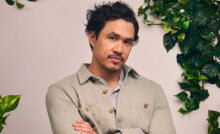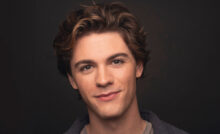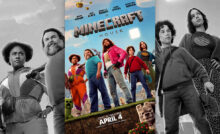Exclusive Interview: Pop Culturalist Chats with Andrew Matarazzo


When the entertainment industry was flipped on its head last year as a result of the pandemic, artists (like everyone else) had to find new avenues for their creativity. For actor Andrew Matarazzo, that meant diving into his debut novel, Bedlam, and releasing his first single, “Omertà”. Pop Culturalist caught up with Andrew to chat about those huge milestones, how he’s been able to stay connected with fans during COVID, and his latest film project, He’s All That.
PC: As we have all tried to stay connected during COVID, you’ve done so with interactive zoom experiences with your fans. Why has that always been so important to you?
Andrew: I was doing a lot of in-person conventions, traveling sometimes up to five times a year to Europe. That was my main source of connecting with them in person and not just as names on social media; I was able to actually see them in person. That was one of the first consequences of the lockdown. All these conventions that I planned to see everyone at for the past three and a half years were canceled. I didn’t realize how big a part of my year they were and how important it is that I touch base with all these people that support me and get to spend some face-to-face time with them. It’s like seeing your family. It was a huge loss.
I heard that there were virtual conventions, and all of a sudden it clicked in my brain. I was like, “That’s so easy for me to do myself. I can organize it.” I thought it was going to just be a couple of sessions and then it would die out, but it’s become a weekly meetup. That’s a big reason that my lockdown has felt very productive. It’s also been good for my mental health.
PC: While the industry has shut down for most of 2020, you’ve turned to different facets of your talent. Tell us about Bedlam.
Andrew: I’ve had the idea of Bedlam in my head for four years. It’s very strangely based on a pandemic. Lockdown was the first time that I had nothing going on, so I could fully concentrate on sitting down for hours and getting all my thoughts out on paper and really flesh out these characters that have been swimming in my brain for so long.
There were so many parallels between how the viruses started and how society reacted to them. I remember there was a really creepy part very early on in the book where I was describing all these cars leaving town and getting stuck in this traffic jam, and how the characters were tying shirts and wearing bandanas on their faces. I was like, “Oh my God.” It’s weird how you think you would handle a situation like this. Then, actually experiencing it as I was writing brought a different dynamic to the book.
As soon as I started writing it, it became my daily routine. It was such an amazing thing to have something to wake up and do every day. I’m a very schedule-oriented person and I had no schedule whatsoever. It was nice not only creatively, but also routine-wise.
PC: In addition to the book, you also released your debut single. Tell us about “Omertà”.
Andrew: This was another idea that had been swimming in my head for a while. “Omertà” is an Italian word that basically means the mafia’s code of silence—it’s their code and guidelines. I always liked that word. I saw it pop up in a lot of TV shows and movies that really influenced me as an actor, like The Godfather and The Sopranos.
I’m also Italian. My mom’s from Rome, so Italian culture has always been really prevalent in my life. The Matarazzo name has a lot of history in Italy. I even have a book about my entire family heritage that goes back and shows all of my family’s businesses, letters, and pictures from my Italian side of my family living in Italy.
It’s weird because I was raised in Brazil, but culturally, a lot of my Italian side is intertwined with my Brazilian side. I feel like I’ve always led with my Brazilian culture, but the Italian side of me is there too. It felt like a marriage of my heritage and influences to create “Omertà” and make it something cinematic. In the lyrics, you’ll hear that there are a lot of mafia terms and jargon intertwined into the lyrics. I did a lot of research into the way the mafia talks. There are a lot of code names and code words, so I mixed those into the lyrics.
For the music video, I intertwined a lot of my heritage into the visuals. I wear my Matarazzo family ring in a lot of the shows. I have a cameo of my family book in the film and I placed little things around, like my grandfather’s camera on the desk. In the cover art, I’m wearing a lot of my grandfather’s shirts and blazers. It’s very much paying homage to my Italian side, but also keeping it very cinematic so that my actor side can play this persona and character that I would love to play.
PC: Actor-musicians have often said there’s a different level of vulnerability that you have to tap into when you’re releasing your own music. Do you feel similarly? Is that nerve-wracking?
Andrew: Yeah. There was a reason why it took me so long to release my original music. If I couldn’t meet the vision a hundred percent and execute it at the level that I wanted, I didn’t even want to start. As I got more access to working with producers and songwriters and honed in on what my sound would be, which I discovered through doing covers, I became more confident about it. I’m approaching my music like I approach acting, which I’m not sure if that takes away that vulnerability, but it makes me more comfortable. The lyrics are lines and the emotions that you convey as an actor. I’m bringing that to my singing and even my visuals with the music video.
I approached it like a film. I’m actually not singing in the music video at all; I’m playing a character that compliments the visuals. I found that when I approached music that way, it gave me this confidence boost. That’s how I want to approach every song. I want every song to have a persona and role that I’m playing. That helps me write lyrics as well.
PC: The music video dropped on Christmas Day. You’ve spoken about this a bit, but can you tell us about the process of putting it together and the aesthetic you were going for?
Andrew: It was a really incredible process. I had such a vivid idea in my head to do a period piece inspired by The Godfather, and I just found out that Christmas Day is the thirtieth anniversary of the film. I was very hesitant about doing crowdfunding because I wanted to be sensitive to the times and how hard everything has been with the coronavirus and people’s jobs, but I actually asked fans what they thought about that before I even began the crowdfunding page. They were all so excited about it and wanted to contribute in any way they could, so I decided there was nothing to lose. If I didn’t raise anything, we could figure out another strategy.
But, so many people were excited about it. It went above and beyond what I thought it would. People in my life came together to make it happen. All these different artists and creatives that I’ve accumulated relationships with as I’ve out here in LA—they all came together to help get me certain things that we couldn’t afford with the budget. It restored my faith in LA and in artists in general. Everyone was so down to make something and help me because they saw how passionate I was about the vision. I was extremely specific with what I wanted. I’d rather not do something than do something half of what I’m envisioning.
I was very hands-on with the entire thing. I was a producer. I put all the teams together, made a million calls to book locations, organized props. Benjamin Hall, my stylist, pulled sixteen different looks for the video. It’s almost like a fashion film as well as a music film, which is cool.
On the day of the shoot, I was wearing a million hats. I was directing. I was trying to fix specific lighting with the help of crew members. I was set dressing because I wanted very specific things on the desk or on the table. It was a lot of hats, which is cool because I got to stretch my abilities and test all the different ways I could make my vision come to life.
PC: On top of all you’ve done, you also just recently wrapped on He’s All That. Is there anything you can tease about that project?
Andrew: Some of the original actors are in the movie. It’s a cool take on updating the same story for a new generation. It was one of the most chilled sets I’ve ever been on in spite of how strict all the COVID protocols and guidelines were, which you would think would make it a sterile environment. Everyone and everything was really organized. All the cast members were so fun to work with. It felt like a group of friends at school that made you excited to go to school. Even when I was waking up at four in the morning, it was a nice feeling to know that I got to see my friends.
PC: As we look to 2021, what does the year hold for you?
Andrew: 2021 is still a little up in the air because we don’t know the situation. I’m definitely going to be working on the sequel to Bedlam. It’s called Sweven.
I would love to tackle an audiobook of Bedlam and publish it in hardback. I’ve already been cast in a short film that I can’t say too much about, but I’m very excited about it because I’ll be a producer on that as well. I’m going to have some room to be more hands-on in the way that I like to be involved.
I know some of the conventions are rescheduled, so I’m hoping I can attend those even if they’re with safety protocols and they have to adapt to the new situation. I’d love to do that. Hopefully, auditions will also start to pick up again.
To keep up with Andrew, follow him on Twitter, Instagram, and YouTube. Pick up or stream “Omertà” today.
Recent Posts
Exclusive Interview: Alexander Hodge on Vulnerability, Representation, and His Character’s Journey of Self-Discovery in ‘Grosse Pointe Garden Society’
Alexander Hodge has long been a trailblazer, planting seeds of change with every role he…
Exclusive Interview: Jordan Doww Talks ‘The Way Home’ Season 3, Colton’s Journey, and That Emotional Finale
Jordan Doww is delivering one of the most layered and emotionally resonant performances on television…
Win Tickets to a NYC Screening of A Minecraft Movie
Pop Culturalist is excited to be partnering with Warner Bros. Pictures to give away tickets…
Hannah Fletcher Is Bringing Bold, Unfiltered Conversations to the Spotlight with Her Upcoming Talk Show
Something big is coming—and Hannah Fletcher is at the center of it. With a mic…
Exclusive Interview: Gregory Zarian on Living Fearlessly, Loving Freely, and Holding Space in ‘Venice: The Series’
In a world where we’re constantly bombarded by headlines filled with division, tragedy, and heartbreak,…
SXSW 2025: Rachel Lindsay Brings ‘Higher Learning’ and Her Platform with Purpose Home
Rachel Lindsay is no stranger to breaking barriers. A former attorney and media personality, she’s…


